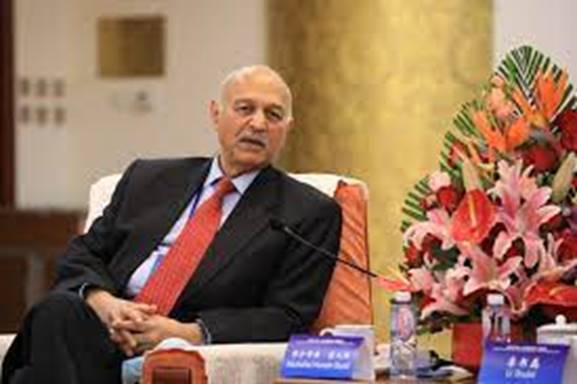
Mushahid Identifies Leadership and Adaptability as Drivers of China’s Global Success
By Celina Ali
Islamabad: Senator Mushahid Hussain Sayed on Wednesday cited effective leadership, stable policies, adaptability, and a peaceful foreign policy as key factors in China’s ascent to global prominence.
Chairing a meeting held to celebrate 75 years of the founding of the People’s Republic of China - “China at 75: A Journey of Progress, Transformation and Global Leadership” - Senator Mushahid Hussain Sayed highlighted China’s peaceful rise to global leadership without invasion, aggression, occupation, or colonization, attributing its success to peaceful leadership, stability, adaptability, and commitment to learning. The conference was hosted by the Pak-China Institute.
He described Pakistan-China relations as unique as they are neither transactional nor tactical but rooted in deep strategic cooperation.
Reflecting on China’s recent history, Senator Mushahid Hussain summed up China’s 75 years in what he termed were ‘3 R’s: Revolution under Chairman Mao, Reform under Deng Xiaoping, and now peaceful Rise under President Xi Jinping.
Referring to his interaction at an American think tank in Washington, DC, where the Senator was asked: ‘which side are you on? he retorted: ‘Pakistan is on the right side of history, and the course of contemporary history is determined by the Asian Century, where China is our reliable strategic partner’.
He also appreciated Deputy Prime Minister Ishaq Dar’s role in raising the voice for Dr Afia Siddiqui at the highest levels of the Biden Administration and inviting Palestinian students from Gaza to study in Pakistan.
The conference was uniquely marked by international representation from South Asia, featuring Mahbub Alam, Leader of Bangladesh Nationalist Party; Ahmed Thariq, Member of Parliament from the Maldives; and Achyut Prasad Mainali, Member of the Federal Parliament of Nepal.
Jiang Zaidong, Ambassador of the People’s Republic of China to Pakistan expressed his heartfelt gratitude to Senator Ishaq Dar for his attendance, despite his 32-hour journey from Samoa, underscoring the significance attached to the event.
Ambassador Jiang celebrated the Belt and Road Initiative (BRI), now joined by over 150 countries, as a testament to China’s commitment to shared prosperity.
He further emphasized the pivotal influence of President Xi Jinping’s Thought on Socialism with Chinese Characteristics, which has guided China’s progress and resilience in this new era.
Expressing appreciation for hosting China’s prime minister at the recent SCO summit, Ambassador Jiang advocated for deeper, more comprehensive cooperation among global south nations to foster equitable development and shared progress.
He outlined Chinese concerns for the security of its personnel and projects in Pakistan, urging the Pakistan government to take ‘effective remedial measures to prevent recurrence of such terror acts and ensure that the perpetrators are identified, caught and punished’.
Dr Ishrat Husain, Economist/Former Governor of State Bank of Pakistan highlighted China’s extraordinary journey, achieving unprecedented progress through strategic shifts from a rural to an urban economy and transitioning from a command-driven to a market-oriented system.
He emphasized how China’s success challenges the Western democratic model, showcasing that political centralization within the Communist Party can coexist with economic decentralization, where over 70% of public expenditures are managed by local governments. Despite its 1.4 billion population, China integrated itself into the global economy, becoming the largest export destination and a key trading partner for over 120 countries.
Recognizing the positive impacts on Pakistan, Dr Hussain refuted the misconception of CPEC as a debt trap, asserting that Pakistan has substantially benefited from China’s investments, while China’s approach of non-interference and responsiveness to other nations’ needs solidifies its global leadership.
Qaiser Ahmed Sheikh, Federal Minister for Maritime Affairs affirmed the enduring bond between Pakistan and China, describing the two nations as “iron friends” bound by an all-weather friendship and emphasized the role of Gwadar Port as the centerpiece of CPEC.
Mahbub Alam, Leader of the Bangladesh Nationalist Party, highlighted China’s remarkable ascent to global power since 2013, attributing this progress to its focused vision of national rejuvenation. He noted that China is well-positioned to lead the 21st century, with the Belt and Road Initiative (BRI) playing a pivotal role in shaping future global development.
Alam emphasized China’s commitment to fostering strategic partnerships across Asia, exemplified by its cooperation with Bangladesh within the BRI.
Shakeel Ahmad Ramay, CEO of Asian Institute of Ecocivilization Research and Development highlighted China’s transformative approach to poverty alleviation, attributing its success to practical, common-sense solutions.
He explained that China initially prioritized land reforms, followed by strategic adjustments to increase output prices while reducing input costs, creating a favorable environment for economic growth. In 1949, China’s literacy rate was a mere 20%, a figure that has now surged to nearly 100% due to comprehensive education initiatives.
Health also became a focal area, ensuring a healthier workforce and population. Infrastructure was another key pillar, with China now boasting 177,000 kilometers of highways and 97% of the country connected to 4G networks, providing the backbone for continued socioeconomic development and connectivity across the nation.
Tariq Fatemi, Former Diplomat and Special Assistant to the Prime Minister on Foreign Affairs, addressed misconceptions about China’s rise as a threat to global stability, emphasizing that China has never harbored extraterritorial ambitions…

